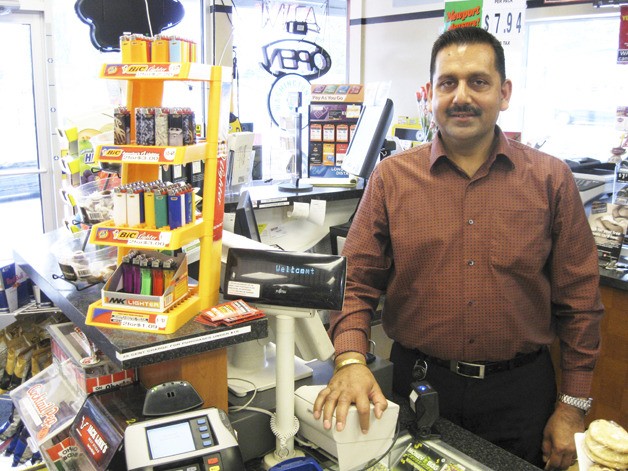Editor’s note: This is the second of a three-part series looking at diversity in the Auburn community.
Customers and coworkers call him Joe.
In his native land, he is known as Joginder Sandhu, a bright man, a steady entrepreneur and the son of a farmer who raised a large family in agrarian northern India. The city of Amritsar, which sits close to India’s western border with Pakistan, is considered the beating heart of the Sikhs’ cultural, religious and political history.
But in his newfound home, Sandhu is an ordinary Joe working to make a name for himself as an Auburn small business owner, a Lea Hill homeowner and a husband and father with a large family of his own.
“I like what I have here,” Sandhu said during a pause in his hectic work day managing the Texaco Food Mart on the busy corner of Auburn Way North and South 277th Street. “I enjoy my work.”
And in his own way, he enjoys making it go.
Running a convenience store is daunting, but Sandhu is finding his niche in a locale that stands to grow commercially.
“It’s going to come sooner or later,” Sandhu said of the likelihood of more business development sprouting on Auburn’s north side.
Sandhu represents a trend in Auburn and South King County. More business owners from diverse backgrounds are establishing roots and taking leadership roles in their communities.
Sandhu is not alone.
The new Marvel Food & Deli on C Street Southwest, a hub of Auburn’s Ukrainian community, thrives under the ownership of Andrey and Nadya Ivantsov. Chinese immigrants Ivy Chen and Bing Zhao have opened a bistro on Auburn’s west end. The Gomez family has revitalized a Mexican restaurant on the north end. A growing Korean congregation has revived the former White River Presbyterian Church, a part of Auburn’s faith community for more than 140 years.
Where it was once predominantly white Caucasian with a large influence of Native American and Japanese American communities, Auburn now reflects a greater mix of races – a growing, global influx of Asian, Hispanic, Latino, Polynesian, Middle Eastern, Russian, Ukraine and Eastern European people.
According to the 2010 Census, Auburn reflects the growing diversity of South King County’s population. In fact, persons of color now make up more than one-third of the population.
They come from larger cities to find affordable housing, modest income and a good quality of life. They come to discover good churches, schools and stores. Some have opened up shops of their own.
“They have become a fabric of our community,” said Ralph Ibarra, diversity consultant and City of Auburn diversity liaison. “New immigrants are just getting started on their path to be successful Americans. They have a lot to offer. They are kind … resourceful … and bring a work ethic.”
That work ethic can be found in the changing complexion of Auburn commerce.
Doug Lein has been the City’s economic development manager for only a few months, but already he has noticed the demographics. While it is difficult to gauge the exact number of recent business startups, Lein says it is “about 50-50” with respect to the number of business licenses issued to those of diverse backgrounds compared with those of Caucasian background.
That diversity is particularly noticeable in Auburn’s boutique retail, Lein pointed out.
The mix has brought new challenges, ideas and opportunities for the business community.
For immigrants, Auburn provides a welcome place to start again, considering the many restrictions and obstacles prevalent in other countries.
“One of the attractions is that we are an open, capitalistic society,” Ibarra said. “They have the opportunity to establish a business … be successful … and be your own boss.”
Making it work
Sandhu established a working relationship with the City of Auburn. He had managed convenience stores in California and Seattle, and used his business acumen to get started in Auburn.
“The City was very helpful,” said Sandhu, who also worked in real estate and finance before going into business for himself. “They have been very supportive, like a family, to me.”
Not all have made the transition.
Auburn leaders and ethnic groups face the challenge of overcoming cultural and language barriers to build lasting, trusting relationships.
Many cultures distrust government. And many other ethnic groups don’t know where to begin to establish themselves in a new place. City officials are working to bridge those gaps, providing the tools to get minority-owned and -operated business started.
City and community leaders are willing to get them acclimated. The City offers a series of workshops on a wide range of subjects – from loss prevention to emergency management – to assist and counsel minority proprietors.
“We’re trying to build that layer of trust,” Lein added.
Auburn promises to grow, and the migration of diverse workers will be a part of its economic impact. The area has and continues to provide jobs in manufacturing and distribution sectors.
And that is part of the attraction.
The City has built a promising business connection with sister city, Tamba, Japan, and its merchant association in a push to do some export business. It is a relationship that hopefully will bear results.
Auburn’s diverse communities also stand to recruit new business, City officials say. A diverse community has advantages that cannot be ignored.
“(Companies) found that to be very attractive,” Lein said. “They found they could hire locally.
“I honestly believe our diverse population is real plus,” he added. “It brings in a new, diverse attitudes, ideas and work ethics. … It makes for a strong working community.”
Sandhu, part of the changing community, making the most of his opportunity.
“I knew I was going to do it. I knew I was going to be successful,” he said. “You have to work hard to earn it.”



